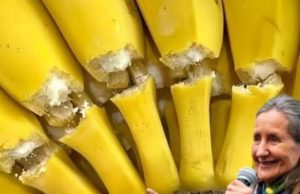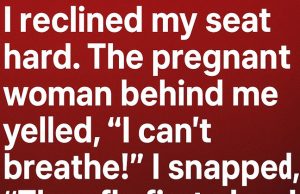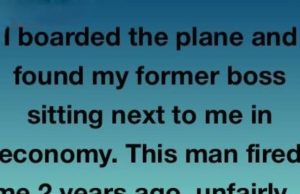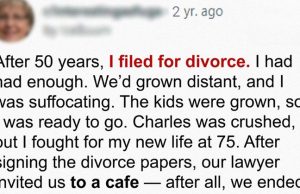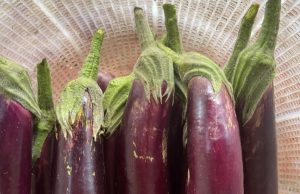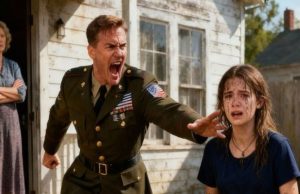
After my husband’s funeral, my son took me to the outskirts of town and said, “This is where you get off, Mom. We can’t support you anymore.”
But I carried a secret I had kept for a long time, and one that my ungrateful son would eventually regret.
On the day of my husband’s burial, it was drizzling.
The small black umbrella wasn’t enough to hide the loneliness I felt in my heart. I trembled as I held the incense stick and looked at the freshly dug grave, the earth still damp.
My companion of almost forty years—my beloved Ramón—was now nothing more than a handful of cold earth.
After the funeral, I didn’t have time to wallow in sadness.
My eldest son, Jun, whom my husband trusted implicitly, took the keys without delay.
A few years ago, when Ramón was still healthy, he said to me,
“We’re getting old. Let’s put the title deed in Jun’s name so he’ll be responsible.”
I didn’t object—what parent doesn’t love their child?
So the house and land were transferred to Jun’s name.
On the seventh day after the burial, Jun suggested I go for a walk to clear my mind.
I didn’t expect that walk to feel like a st:a:b in the back.
The car stopped on the outskirts of town, near an abandoned jeepney stop.
Jun said coldly,
“Get out here. My wife and I can’t support you anymore. From now on, you’ll have to take care of yourself.”
My ears were ringing, my vision darkened.
I thought I’d heard wrong.
But his eyes were determined, as if he wanted to push me out of the car.

I sat, in sh0ck, on the side of the road, next to a small shop. I only had a cloth bag with some clothes.
The house—where I lived, took care of my husband, and raised my children—no longer belonged to me. It was in his name. I had no right to return.
They say, “when you lose your husband, you still have your children,” but sometimes having children is like not having any.
My own son cornered me.
However, Jun didn’t know: I wasn’t empty-handed.
In my breast pocket, I always carried my savings account—the money my husband and I had saved throughout our lives, equivalent to tens of millions of pesos.
We hid it well, without telling our children or anyone else.
Once, Ramón told me:
“People are only good when they have something going on.”
That day I decided to stay silent.
I didn’t beg, I didn’t reveal any secrets.
I needed to see how Jun and this life would treat him.
The first day they left me alone, I sat on the store porch.
The owner—Aling Nena—took pity on me and offered me a cup of hot tea.
When I told her I had just lost my husband and that my children had left me, she sighed deeply:
“There are many situations like this these days, dear. Children value money more than love.”
I temporarily rented a small room, paid for with the interest withdrawn from my savings account.
I was very cautious: I didn’t tell anyone I had a fortune.
I lived simply, wore old clothes, bought cheap food, and didn’t attract attention.
There were nights when, curled up in my wobbly bamboo bed, I missed my old house, the creaking of the ceiling fan, the aroma of the ginger salad Ramón was preparing.
The nostalgia hurt, but I told myself: as long as I’m alive, I must move on.
I began to adapt to my new life.
During the day, I would ask for work at the market: washing vegetables, carrying things, packing.
The pay wasn’t much, but I didn’t care.
I wanted to stand on my own two feet, without relying on pity.
The market vendors called me “the kind Mama Teresa.”
They didn’t know that every time I returned to my rented room, I would briefly open my savings account and then carefully put it away.
That was my secret to survival.
One day, I ran into an old acquaintance—Aling Rosa, my best friend from my youth.
Seeing me in a rental house, I simply told her that my husband had passed away and that life was difficult.
She took pity on me and invited me to help out in the family carindería.
I accepted.
The work was hard, but I had a place to sleep and food guaranteed.
That gave me even more reasons to keep my savings account a secret.
Meanwhile, news about Jun continued to reach me.
He lived with his wife and children in a spacious house, bought a new car, but got involved in gambling.
An acquaintance whispered:
“I’m sure he’s already pawned the title deed.”
My heart ached when I heard that, but I decided not to contact him.
He had chosen to abandon his mother by the side of the road.
I had nothing left to say to him.
One afternoon, while I was cleaning at the carinderia, a strange man arrived.
He was dressed elegantly, but his face was tense.
I recognized him: he was Jun’s drinking buddy.
He stared at me and asked:
“Are you Jun’s mother?”
I stopped and nodded.
He approached, his voice urgent:
“He owes us millions of pesos. He’s in hiding now. If you still want him, save him.”
I was stunned.
He only gave a bitter smile:
“I’m so broke now, I can’t help him.”
He left angrily. But that made me think a lot.
I loved him, but I was deeply hurt.
He, who had mercilessly abandoned me at that jeepney stop.
Was he now getting what he deserved? Was it fair?
A few months later, Jun came to see me.
He was thin, emaciated, his eyes red.
As soon as he saw me, he fell to his knees, his voice breaking:
“Mom, I was wrong. I was a wretch. Please save me one more time. Otherwise, my whole family will be lost.”
My heart was in turmoil.
I remembered the nights I cried for him, the abandonment I suffered.
But I also remembered what Ramón had told me before he died:
“No matter what happens, he’s still our son.”
I was silent for a long moment.
Then I walked into the room and took out the savings account—the money my parents had saved their entire lives, equivalent to tens of millions of pesos.
I placed it in front of Jun and looked into his eyes, my voice calm:
“This is the money my parents left me. I hid it because I was afraid you wouldn’t appreciate it.
I’m giving it to you now, but remember: if you trample on your mother’s love again, no matter how much money you have, you’ll never be able to hold your head up with dignity.”
Jun trembled as he received the notebook.
He cried like a child in the rain.
I knew maybe he would change, maybe not.
But at least I had fulfilled my last responsibility as a mother.
And the secret of that money—finally—was revealed, just when it was needed.

